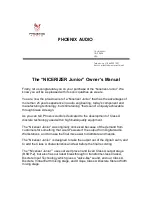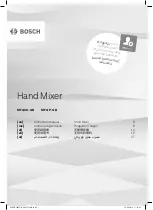
Rear Panel Connections:
Inputs:
On the rear panel there are 2 Tascam DA88 Wire D-sub input connectors Numbered 1 – 8
and 9 - 16. These
correspond with the Pan controls and monitor control on the front panel.
These are Balanced XLR Inputs, but are equally capable of accepting an
unbalanced signal without the 6dB loss often associated with sending an
unbalanced signal into a balanced input.
Main Outputs:
There are 4 x Main output XLR’s labelled Output L and R on output A and Output L and
R on output B. These provide access to the 2 mix busses which are transformer-balanced
Outputs driven by our Class A, Discrete DSOP-2 Output stages, and can be used in either
balanced or un-balanced mode. These outputs can also be chained to any number of
pieces of external equipment as long as total loading does not exceed 600R.
Front Panel:
Pan Controls
The front panel has 2 rows of detented Pan controls numbered 1 - 16 associated with the
Input on the rear panel. Each channel is individually controlled and can be
panned From Left to Right, and anywhere in between.
+8 dB Push-button switches
Between the rows of Pan controls there is a row of Push-button switches marked
+8. Each switch is associated with an individual channel, and pressing a switch
will add an additional gain of +8dB to the input of that channel.
Main Output Level Control
The Main Output Level control is used to adjust the Main Output Level of the unit on the
main Output XLR’s, there are two sets of controls – A & B, both these are identical and
all 16 channels are fed simultaneously to both outputs, which are independent of each
other. Two sets of controls allow the Nicerizer Junior to mix two different mixes with
different level controls and differing tones or splitting signals by sending one into a DAW
and another into a monitoring box or hardware compressor or EQ.
Illuminated Mains switch.
Switching this switch into the ‘ON’ position so that the Neon glows, has a profound
effect on the sound quality and gain of the unit. This is best left in the “ON” position for
normal use.
J





















